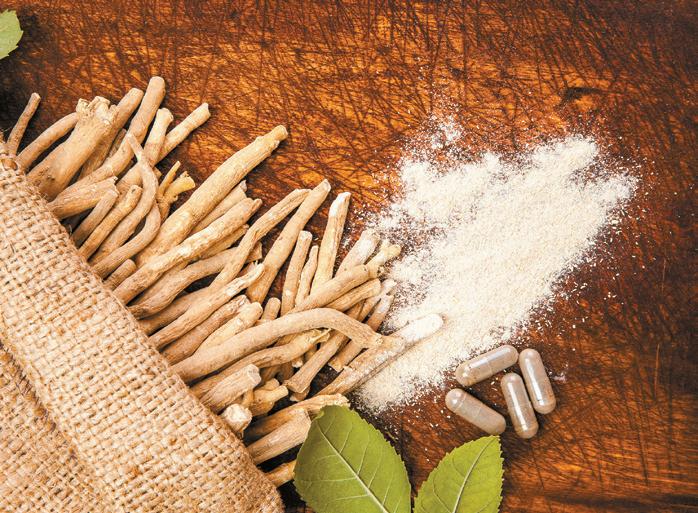
4 minute read
health briefs
Try Ashwagandha for Anxiety
In just the first month of the 2020 pandemic, the use of antianxiety medications increased by 34 percent among Americans, according to pharmaceutical surveys. Because select serotonin reuptake inhibitors (SSRI) in particular tend to lose their effectiveness over Storyblocks.com time, some sufferers may take heart in a new study in Current Clinical Pharmacology. Iranian researchers gave one gram of ashwagandha root extract (Withania somnifera) each day for six weeks to 22 patients with generalized anxiety disorder and a placebo to a second group of 18. People in both groups were also put on SSRIs. Anxiety scores for the ashwagandha group improved by week two and kept improving during the study, significantly outperforming the scores of the control group. The extract was considered safe and free of side effects.
Advertisement
Improve Muscle Strength with Schisandra Schisandra chinensis, an ornamental, woody vine with pink leaves and bright red berries, has long been used as an adaptogen in China and Russia to lower stress, improve immunity and enhance energy. Korean researchers in a new study in Phytochemical Reviews report it may also be a boon for aging muscles. They tested 45 post-menopausal women that were given 1,000 milligrams of Schisandra chinensis or a placebo for 12 weeks. Compared to the control group, the Schisandra group had significantly increased quadriceps muscle strength and lower lactate levels, indicating greater endurance.
alex coan/AdobeStock.com

Try Ginger Extract for Hay Fever
For people suffering from the miseries of allergic rhinitis, better known as hay fever, ginger extract can be just as effective as the popular pharmaceutical product loratadine (Claritin), concludes a study from Thailand’s
Thammasat University. Eighty hay fever patients were given either 500 milligrams of ginger extract or loratadine. After three and six weeks, the ginger group’s improvements Storyblocks.com in nasal symptoms and quality of life matched those of the loratadine group, but those taking ginger had fewer side effects such as drowsiness, fatigue, dizziness and constipation.

Massage & Bodywork Energy Therapy & Coaching
1941 Savage Rd. #100E (Inside Lowcountry Wellness) (843) 729-3635
Mention this ad for 10% off your first service
Be at war with your vices, at peace with your neighbors, and let every new year find you a better man. ~Benjamin Franklin
WE’VE MOVED!
LOCAL ART & GIFT SHOP MONDAY-FRIDAY 10AM-6PM SATURDAY 10AM-4PM BY APPOINTMENT ONLY: REIKI • CARD READINGS AKASHIC RECORDS PET MEDIUM (843) 388-7338 1405 BEN SAWYER BLVD MOUNT PLEASANT, SC 29464

fecal Transplant Helps Caesarean Babies
A downside of the rising number of caesarean (Csection) births is that it deprives babies of contact with bacteria from the mother’s Storyblocks.com gut microbiome, which impoverishes the baby’s own microbiome and raises the risk of allergies and obesity later in life, as studies show. Previously, researchers swabbed C-section babies’ mouths with vaginal bacteria, but it had no effect. In fact, the valuable gut bacteria are released in the mother’s fecal matter during the messy process of birth.
In a pilot study, doctors from the university of Helsinki tested 17 mothers that were about to need C-sections and chose seven that had fecal matter free of pathogens and antibiotics. After the babies were born, doctors used a syringe to feed the infants a tiny amount of the previously harvested fecal matter mixed with breast milk. The babies had no negative responses. Within three weeks, those babies’ gut flora came to resemble more strongly the gut flora of babies born vaginally than that of those born through C-sections.

vitamin D Important for reducing risk of Preeclampsia Something as simple as a mother’s vitamin D level can have a future impact on her children, a study from Johns Hopkins Bloomberg School of Public Health shows. Researchers examined 20 years of health data from 754 Boston-area mothers and their children and found that preeclampsia—abnormally high blood pressure during pregnancy— was linked to a higher systolic blood pressure in the children during their early and teen years. However, the effect was minimized or even eliminated among children exposed to higher levels of vitamin D in the womb, as measured by blood levels in the umbilical cord.
Avoid fluoride to Lower risk of Behavioral Issues in Children

Fluoride is added to public water supplies to reduce tooth decay, but its effects on health are contentious enough that only 38 percent of Canadian and 3 Storyblocks.com percent of european public water supplies are fluoridated, compared to 74 percent in America. Its effects on neurodevelopment in children are a particular concern: a meta-analysis correlated high levels of fluoride in water with a sevenpoint drop in children’s IQ scores. Two new studies have linked fluoride exposure to ADHD and other behavioral issues in children.
Canadian researchers that collected urine samples and tap water information on 1,877 children between ages 6 and 17 found those that lived in areas with fluoridated water had 2.8 times the incidences of ADHD diagnoses, as well as increased symptoms of hyperactivity and inattention. The effect was most pronounced in teenagers, suggesting a cumulative effect over time, wrote the authors in the journal Environment International. In a Chinese study published in the International Journal of Environmental Health Research, 325 children between ages 7 and 13 were studied, and higher levels of fluoride exposure were correlated with rises in behavioral issues, especially psycho-somatic symptoms.

Storyblocks.com










